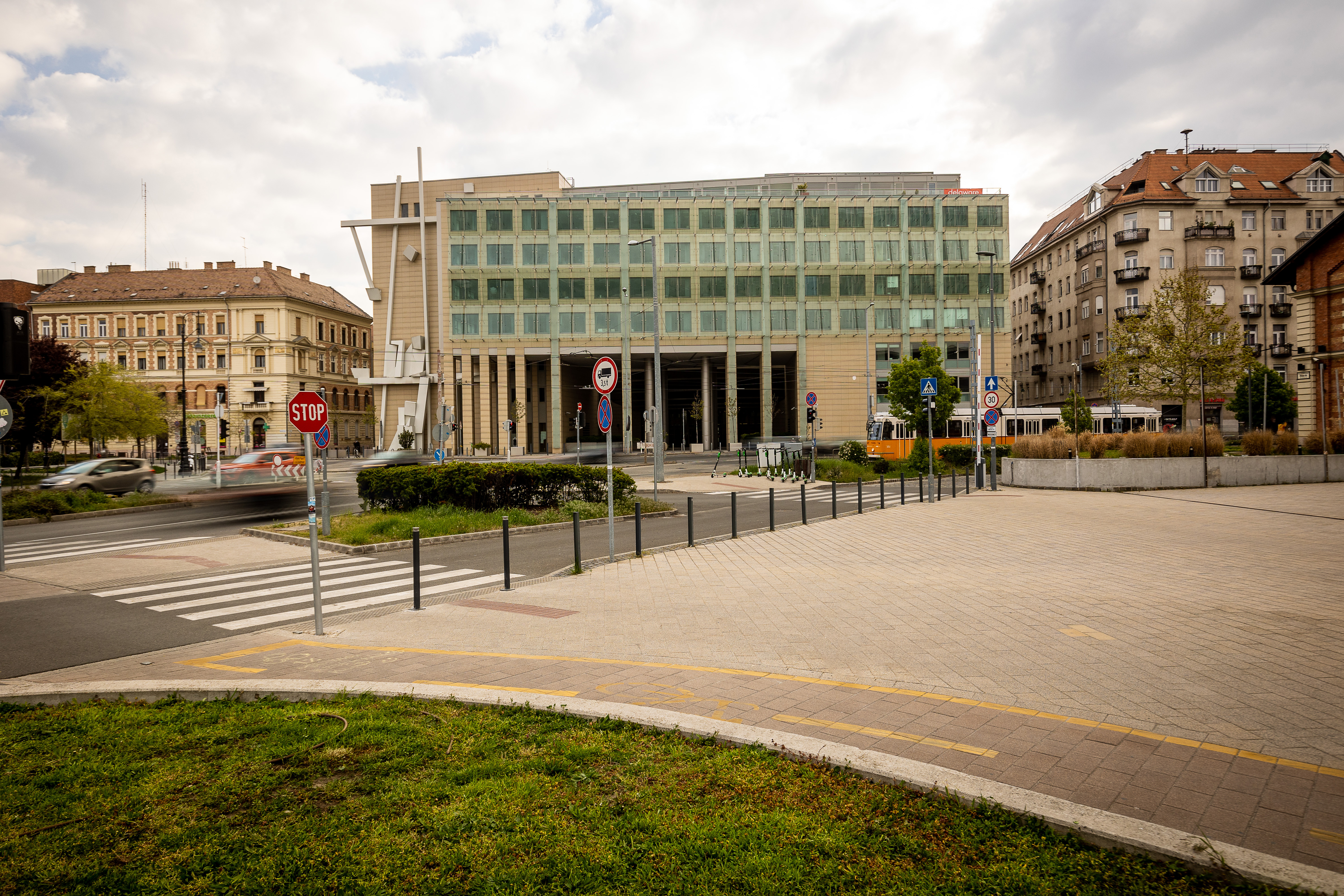Outgoing Rector, President’s report and new Student Requirements System at the June Senate meeting
The University Senate has amended the Student Requirements System on several points, as well as the Organisational and Operational Procedures. Zsolt Hernádi said goodbye to Rector Dr. András Lánczi, and Dr. Anthony Radev reported on the progress of the Institutional Development Plan. At the end of the meeting, Márton Barta presented the concept of the Corvinus talent management programme and the Inner World project supporting the renovation of the Ménesi Campus.

Written by: Judit Szabó, Máté Kovács
The June Senate meeting was not only the last meeting of the academic year, but also the last Senate meeting of Dr András Lánczi as Rector. “With all the tensions, we have moved forward. This means to me that we are making progress based on our own decisions, and in a few years’ time it will be clear to others why we did what we did,” said the outgoing Rector of Corvinus.
As Rector, he supported academic development issues that took Corvinus University in the direction of its century-old ideals and opened the window to the world at large, for example by renewing the organisational and content framework of doctoral education or by establishing the Corvinus Institute for Advanced Studies, said Zsolt Hernádi.
The Senate and the Board of Trustees had already accepted the application of Dr. Előd Takáts, and his appointment became official on 24 June. Dr Előd
Takáts will take up his post as Rector of the University on 1 August. The Chairman of the Board of Trustees said that the new Rector comes from an international background and has an outstanding record of research and teaching on both the market and academic sides. According to Zsolt Hernádi, his personality could also be important in international competition.
They look at us across borders and within borders, they look at whether we are succeeding in becoming a university that educates the social elite. We want to make significant achievements not only in the region, but also at international level, to keep the leading intellectuals of the future society at home, said Zsolt Hernádi at the meeting.
There has also been a change in the presidency of the Student Council (HÖK). András Lánczi thanked Kristóf Menyhért, the outgoing President of the Student Council, for his work so far, saying that a fruitful relationship had been established between the university administration and the Student Council. The Assembly of Delegates elected Dorina Molnár as President, with Viola Beck and Réka Hodászi as Vice-Presidents.
The President of Corvinus reported on the progress of the Institutional Development Plan
As Anthony Radev put it, the most important question is “what will happen to our students?” The President of Corvinus wants to achieve an eighty per cent chance of students graduating from Corvinus being in the top one per cent, and at least half of the top ten thousand should be Corvinus students.
The Corvinus degree is worth 110 million forints, or EUR 300,000. We intend to double the value of the diploma by 2030, and this is the impact that will be the key element of the renewal, said Anthony Radev.
He mentioned strengthening external funding and international recruitment as areas for improvement. In his view, the backlog in both areas is linked to the epidemic situation and it is hoped that they can be boosted in the short term.
Approved by the Senate the Amendment of the Organisational and Operational Regulations, the planned establishment of the Centre for Educational Quality Development and Methodology
The Senate gave a positive opinion on the proposal, under which the Centre for Educational Quality Development and Methodology would continue to operate as an independent department under the professional direction of the Vice Rector for Education. According to Márton Barta, Corvinus is striving to develop a quality improvement strategy and operations in line with the ESG standards (Standards and Guidelines for Quality Assurance in the European Higher Education).
Furthermore, the MNB Institute will cease to exist as a separate organisational unit, and the coordination of digital developments will be the responsibility of the Student Services department.

Several changes to the Student Requirements System (HKR)
The Student Requirements System is amended annually by the Senate in accordance with the new practice, and all the amendments of the previous year are adopted together.
For example, the Admission Rules have been clarified and adopted by the Senate in addition to the Educational Committee.
Important changes to the Admission Regulations:
- striving for electronic administration (electronic minutes, electronic communication of admission decisions)
- clarified the institutional admission requirements for foreign nationals applying for bachelor’s and master’s degrees
- abolishing the language assessment for undergraduate and masters courses, replacing it with a language examination requirement
- a student applying for a Master’s degree can be admitted with a minimum of a good (4) grade, provided that they apply for admission on the basis of an accredited diploma
- more flexible rules for obtaining missing credits under prior learning
- fixed rules for proctored examinations
- in the case of a multi-part admission test, the university will only invite the candidate to the second part if they have obtained at least 50 percent in the first part
- clarified rules for applying for dual training, part-time training, part-time training, preparatory training, and further vocational training
- defined special admission rules for the IT field of study
The Senate has adopted new Study and Examination Regulations, the amendments are mainly justified by the experience of distance education and the renewed requirements of the degree programmes, according to Dr. Lajos Szabó, Vice Rector of Education.
The most important changes to the Study and Examination Rules (TVSZ):
- establishing the conditions for online enrolment and student decision-making
- coordination of the choice of specialisation, change of specialisation and change of training
- more precise rules on absences from sessions
- revised provisions on professional practice
- more precise rules for the online exam
- new rules on examinations and complex examinations
- new types of thesis
- abolishing the late submission of theses
- clarified rules for the admission of a TDK thesis as a thesis
- clarified rules for final exams
- more precise rules on preferential study arrangements and equity, gave greater powers for the supervisor
The Student Council abstained at the Educational Committee meeting on the TVSZ. Prior to the Senate meeting, the initiatives of the HÖK were discussed with the university management, and the already agreed position was incorporated into the TVSZ, so the HÖK agreed to the text of the new TVSZ. Jácint Farkas, representing the PhD Student Union (DÖK), called the consultation mechanism exemplary.
The conditions of the Corvinus Scholarship were also clarified at the meeting. In the case of a change of course, students do not have to repay the scholarship received in the course they started if they continue their studies at Corvinus at the same level and obtain a degree in the new course under the conditions of the Regulation on Student Fees and Benefits (RSFB). Beyond this, the RSFB has been amended on several points.
Other important changes to the Regulation on Student Fees and Benefits (RSFB):
- the Corvinus Scholarship is only available during an active semester, but is not forfeited after a passive semester if the other conditions are met
- for internships abroad lasting more than six weeks, the semester does not count for reclassification purposes, but the result of the previous semester is doubled.
- The number of available scholarship places is determined on the basis of the number of enrolments, and the Presidential Committee decides on the amount of the balance and the procedure to be followed in the event of a tie,
- MNB scholarships will cease,
- internship scholarships are terminated due to non-application,
- Awards (as recognition) and scholarships have been separated, and the former will no longer be included in the RSFB, but will be defined as a separate award,
- demonstrator activity will be remunerated on an activity-by-activity basis from 2022, but demonstrator work will continue to be supported,
- the Corvinus Excellence Scholarship and the National Higher Education Scholarship will be coordinated
According to Gábor Michalkó, Head of the Corvinus Doctoral Schools, there has been no change in the content of the Doctoral Regulations, they have only been made more streamlined and student-friendly. The amendment was also supported by Jácint Farkas, the head of the Doctoral Student Council, who was the last person to attend a Senate meeting as DÖK president. Formal changes have also been made to the Policy on Ensuring Equal Educational Opportunities for Students with Disabilities, the Student Disciplinary and Compensation Policy and the Student Accident Prevention Policy, as well as the procedure for the handling of first instance applications and appeals in connection with student status.
Starting and discontinuing courses approved by the Senate
The Senate also approved the launch of several new courses and the discontinuation of some courses, the latter due to lack of interest, explained Dr. Lajos Szabó, Vice Rector for Education.
Accepted, starting study programmes:
- Data-driven supply chain management specialised postgraduate specialisation programme in Budapest, in Hungarian and English, part-time, from the spring semester of the academic year 2021/2022,
- Bank manager postgraduate specialisation programme in Budapest, in Hungarian and English, part-time, from the spring semester of the academic year 2021/2022,
- Economist in energy management postgraduate specialisation programme in Budapest, in Hungarian and English, part-time, from the spring semester of the academic year 2022/2023,
- Energy management postgraduate specialisation programme in Budapest, in Hungarian and English, part-time, from the spring semester of the academic year 2022/2023,
Discontinuing programmes:
- postgraduate specialisation programme in bank management (last semester of announcement: spring semester of the 2020/2021 academic year),
- postgraduate specialisation programme in bank management (last semester of announcement: spring semester of the 2020/2021 academic year),

New talent management programme to be piloted in 2021
Talent management has not been far away from the university, with the TDK and autonomous student workshops, i.e. the specialised colleges and student organisations being the main areas of activity. According to Márton Barta, their professional autonomy is a key issue and these organisations should be supported in all respects. To this end, a Talent Council would be set up in the autumn to think together about how to strengthen synergies between the workshops and the university.
The programme with the fantasy name Corvinus Academy of Curiosity will be another pillar of talent management, which would be launched as a professional excellence programme on a pilot basis in 2021. The programme will run for two years and will be open to prospective second-year bachelor students and first-year Masters students. A conscious selection process will be important, where motivation, specific skills and innovative abilities would be taken into account alongside intellectual excellence. The programme will be based on quarterly modules, organised into tracks. The programme will consist of non-classical coursework and will be mainly in English.
Márton Barta stressed that this is a pilot project, which means that the modules will be developed during the first year. In the first year, it is planned to launch pilot modules on topics such as data science, sustainability, economics and business development.
The programme was supported by Kristóf Menyhért, President of the Student Council, and Gábor Toronyai, President of the Trade Union.
The Inner World Project supports the renovation of the Ménesi Campus
The Inner World Project is a professional and interior design project of the University Foundation, whose task is to design the interior of the Ménesi Campus. The project was presented by Márton Barta, Head of Strategy at Corvinus.
The building consists of two wings and a connecting part. The latter will house the auditorium and buffets, where the focus will be on community life. The higher tower will have 4 dormitory levels, and the top level will accommodate foreign visiting lecturers in professorial guest rooms.
The third part of the building will house educational spaces that essentially support creative collaboration. The renovation is currently scheduled to be completed in the first quarter of 2023, which means that the Corvinus community will be active in the autumn semester of 2023.
At the end of the meeting, Dr. András Lánczi also spoke about staff policy at the initiative of Dr. Gábor Toronyai. According to the President of the Trade Union, the University has acted unfairly in the retirement of several colleagues, but the Rector of Corvinus says this is not true. Everyone was consulted personally and the decision was taken on a purely professional basis, by mutual agreement with most of the staff. In specific cases, there were controversial situations, but he was not allowed to talk about them in the Senate meeting for privacy reasons. He stressed that in all cases, they have used professional arguments to support their decision.
